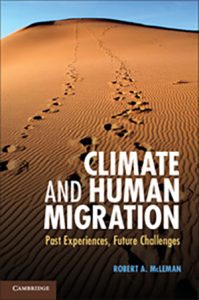Climate and Human Migration: Past Experiences, Future Challenges

Author: Robert A. McLeman
Publisher: Cambridge University Press
Year of Publication: 2013
Print Length: 300 pages
Genre: Non-Fiction / Geography, Earth & Environmental Science, Economics, Law, Migration & Refugee Studies
Topic: Ecology & Climate, Climate Change, Disaster, Migration, Refugees & Forced Migration, Challenges & Opportunities, Future Scenarios, Change, Nature, Economy, History, Environmental Justice, Social Justice, Vulnerability, Policy & Practice
Studies warn that global warming and sea level rise will create hundreds of millions of environmental refugees. While climate change will undoubtedly affect future migration patterns and behavior, the potential outcomes are far more complex than the environmental refugee scenario suggests.
This book provides a comprehensive review of how physical and human processes interact to shape migration, using simple diagrams and models to guide the researcher, policy maker, and advanced student through the climate-migration process. The book applies standard concepts and theories used in climate and migration scholarship to explain how events such as Hurricane Katrina, the Dust Bowl, African droughts, and floods in Bangladesh and China have triggered migrations that haven’t always fit the environmental refugee storyline. Lessons from past migrations are used to predict how future migration patterns will unfold in the face of sea level rise, food insecurity, and political instability, and to review options for policy makers.
This book:
- Provides a comprehensive review of how physical processes related to climate influence human migration patterns and behavior
- Examines specific examples of recent climate-related migration to help understand how climate change will influence future migration patterns
- Links discussion to current research and policy discussions about climate change adaptation, food security, state security and other emerging issues
Table of Contents
List of Figures
List of Tables
Preface
Acknowledgments
1. An Introduction to the Study of Climate and Migration
2. Why People Migrate
3. Migration in the Context of Vulnerability and Adaptation to Climatic Variability and Change
4. Extreme Weather Events and Migration
5. River Valley Flooding and Migration
6. Drought and Its Influence on Migration
7. Mean Sea Level Rise and Its Implications for Migration and Migration Policy
8. Emergent Issues in Climate and Migration Research
Annex – Estimates of Global Population Exposed to Tropical Cyclones
References
Index

Robert A. McLeman is Professor at Department of Geography and Environmental Studies, Wilfrid Laurier University. He specializes in research on the human dimensions of environmental change, with particular attention to the relationship between environment and human migration; community adaptation to climatic variability and change; and, fostering citizen participation in environmental science. As a former Canadian foreign service officer, he worked at Canadian diplomatic missions in Belgrade, Hong Kong, New Delhi, Seattle and Vienna. In recent years he have advised UN agencies, the World Bank, and governments in Canada, the US, and Europe on issues related to climate change, migration, and security. Currently, he is serving as a Coordinating Lead Author for the Intergovernmental Panel on Climate Change’s working group on impacts, vulnerability and adaptation.
Source: https://www.wlu.ca/academics/faculties/faculty-of-science/faculty-profiles/robert-mcleman/index.html
More from Robert A. McLeman in this library, click here.
